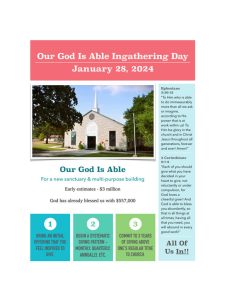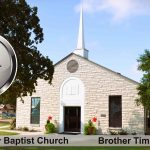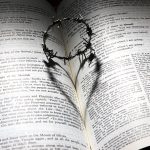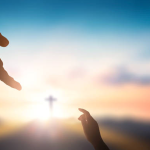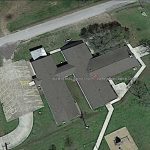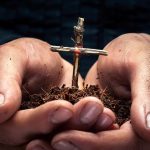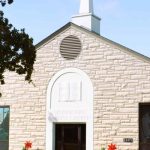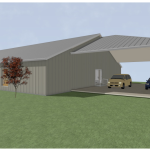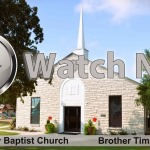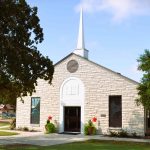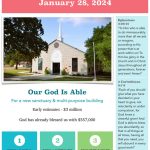Narrator: The land of Judah was only a portion of the old kingdom of Israel. Many people there no longer believed in God. This must have made God sad and angry. Soon Nebuchadnezzar, the king of Babylon, came to Jerusalem to fight with them because he wanted to take their land and their gold and make the people his slaves.
(Background – Jersusalem palace)
Jehoiakim (worried): Nebuchadnezzar has an army outside the city.
Advisor: We cannot defeat them.
J: Do we have to give up? Can no one save us?
A (shakes head): No. Who could?
(The advisor leaves, Jehoiakim puts his head in his hands)
(Nebuchadnezzar enters.)
Nebuchadnezzar: King Jehoiakim, you must give up now.
Jehoiakim (jerks up): Nebuchadnezzar! How is it that you are here?
N: I have the city surrounded. I go where I please. Do you surrender?
J: I cannot. This is our home.
N: Not any more. Your army is defeated. We own Jerusalem now.
J (moans): How did this happen? What did I do wrong?
N: Everything.
J: God has forgotten us. Or did we forget Him?
N: Who is this God you speak of?
J: He cared for us, once. Why did we stop worshipping Him?
N: So I could come here.
N (looking around the palace): You have much gold, my king. I will take all of it with me back to Babylon.
(Background – Babylon palace)
Nebuchadnezzar (reclining): The Jewish people are so strange. Who is this God they pray to?
Advisor: We do not know, your majesty.
N: Have you asked them?
A: Of course. But the things they say…
N: What things?
A: That their God gave them their land. That he answers their prayers. That he protects them from their enemies.
N: He did not protect them very well. We took their city and their gold with barely a fight.
A: Some of the older ones say that many young people stopped worshipping their God.
N: Why does that matter?
A: They say that He let you take the city to teach them a lesson.
N (thinking): Bring me some of their best young men, ones who believe in their God.
A: Whatever for?
N: I want to study them. Teach them our language and our ways. I want to speak to them myself.
A: About what?
N: About their God. I want to know all of their secrets.
(Background – time passing)
(Background – Babylon palace)
Caretaker: Is something wrong, Daniel? You haven’t eaten anything since we brought you here.
Daniel (looking at a plate): I can’t eat this food.
C: Why not?
D: God says that we cannot eat this kind of meat.
C: That is the same food that the king eats.
D: Even so, I cannot eat it.
C (worried): If you don’t eat you will get sick. And the king will blame me.
D: It’s not your fault.
C: The king won’t care. If you die he will kick me out of the palace and my children will go hungry!
D: I will eat only vegetables. I can’t eat anything else you have.
C: You must!
D: God will care for me.
C: I have never known a god who would care for a man like that.
D: Come back in 10 days and see if I am starving. Then you will see.
C: Are you sure?
D: Very sure.
C: Very well.
Narrator: Did Daniel starve? Of course not.
When his guard came back 10 days later he found that Daniel and his friends Shadrach, Meshach, and Abednego were as strong and healthy as ever.
Because they obeyed his laws, God blessed Daniel and the others.
Because of His blessings they learned the Babylonian’s language, laws, and customs quickly. They all become wise young men who were smarter than king Nebuchadnezzar’s other advisors.
(Background – Babylon palace)
Nebuchadnezzar: I am having the strangest dreams. I wish I could understand them. Somehow I know that they are important.
Advisor: Tell your dreams to me, my king, and I will tell you what they mean.
N (scoffs): Your advice is always bad.
A: Excellency, I only –
N: Just stop talking. I have a better idea. You tell me what my dream is about and I will tell you what it means.
A: I can’t do that!
N (angry): Then I will get rid of every wise man in Babylon.
A: Who will advise you, majesty?
N: What good are you to me? You can’t even answer a simple question.
(Background – Babylon palace)
Arioch, Captain of the Guards: Daniel, you must come with me. The king has given me special orders.
Daniel: I know. But why did the king order all of us to put to death?
A: No wise man could tell the king what his dreams were about. Now he has given up on having any use for men like you.
D: I can tell him.
A (surprised): Are you sure?
D: Of course.
A: If you’re wrong the king will be very angry.
D: I won’t be wrong – God will help me.
A: I’ll take you to the king right now.
D: No, I must pray first. In the morning I will go to the king.
A: I should kill you right now.
D: If you do you will never know if I would have been right.
A: Alright. But be in front of the king when the sun comes up.
(Background – night sky)
(Background – Babylon palace)
Daniel (kneeling): “Praise be to the name of God for ever and ever;
wisdom and power are his.
I thank and praise you, O God of my fathers:
You have given me wisdom and power,
you have made known to me what we asked of you,
you have made known to us the dream of the king.”
(Daniel walks through the palace)
D: I can tell you about your dream, sire.
Nebuchadnezzar: How are you able to do this?
D: No wise man can explain to the king the mystery he has asked about.
N: Then how can you know what I dreamed about?
D: There is a God in heaven who reveals mysteries.
N: The God of Jerusalem. I have heard much about him. But tell me about my dream.
D: Are you sure you want to know?
N: Why wouldn’t I? A king’s dreams are the most important thing in the world.
D: What I tell you won’t be easy to hear.
N: Just tell me now! Unless you don’t know…
D: Before you stood an enormous statue. The head of the statue was made of pure gold, its chest and arms of silver, its belly and thighs of bronze, its legs of iron, and its feet were made of baked clay.
While you were watching, a rock was thrown at it – not by human hands but from heaven. It struck the statue on its feet of iron and clay and smashed them. Then the iron, the clay, the bronze, the silver and the gold were broken to pieces at the same time and became like dust on the floor in the summer.
The wind swept them away without leaving a trace. But the rock that struck the statue became a huge mountain and filled the whole earth.
N (amazed): Amazing! That was my dream! But what does it mean?
D: God has shown me that as well. You have been made king over all of these lands and people. So the statue’s golden head is you and the statue’s body is your kingdom. Both will be destroyed by outsiders.
N: Why would such a thing happen? How could it? My armies are strong!
D: You have displeased God and He will not stand for your evil ways. He has shown me this.
N (falls down before Daniel): Surely your God is the God of gods and the Lord of kings and a revealer of mysteries, for you were able to reveal this mystery.
D: God knows all, sire.
N: I shall put you in charge of many lands and your friends also. All of the wise men in Babylon will work for you.
D: Then they will work for God.
N: So be it.
Narrator: Nebuchadnezzar saw God’s power because of Daniel but he did not truly believe in Him.
Later, when he’d forgotten all about his nightmares the king stopped obeying God and instead made a 90 foot tall statue of pure gold and began to pray to it instead of God.
(Background – Babylon desert plain and idol)
(Nebuchadnezzar watches)
Herald: This is what you are commanded to do. All people, nations and men of every language: As soon as you hear the sound of the horn, flute, harp and all kinds of music, you must fall down and worship the image of gold that King Nebuchadnezzar has set up.
Whoever does not fall down and worship will immediately be thrown into a blazing furnace.
(Music plays)
(Background – Babylon desert plain and idol shows people bowing to statue)
H (pointing): Your majesty! Those men over there! They are not bowing to your mighty statue!
Nebuchadnezzar: Who are they?
H: They are the Jews whom you have set over the business of Babylon — Shadrach, Meshach and Abednego.
N: I remember their friend Daniel. His God saw into my dreams when the wise men could never do so.
H: The Jews pay no attention to you, O king. They neither serve your gods nor worship the image of gold you have set up.
N: They must!
H: They do not.
N: Then they must go into the furnace with the rest of the people who refused me.
H (smiling): My king, they are the only ones who dared to disobey you.
N: That is even worse. Everyone else is worshipping my statue. Why won’t they?
H: They think they are better than you.
N: Better than a king? I will teach them a lesson. Bring them to me outside the furnace.
(Background – fiery furnace)
Nebuchadnezzar: Is it true, Shadrach, that you, Meshach and Abednego, do not serve my gods or worship the image of gold I have set up?
Shadrach: It is true.
N: What gods do you worship?
S: Only the God of Jerusalem.
N (scoffs): Daniel’s god of dreams, is it?
S: Yes
N: I am tired of hearing about that. But you have served me well. I will give you one more chance to worship my statue.
S: We will not.
N (angry): You will! When you hear the sound of the music, if you are ready to fall down and worship the image I made, very good. But if you do not worship it, you will be thrown immediately into the blazing furnace. Then what god will be able to rescue you from my hand?
S: King Nebuchadnezzar, we do not need to defend ourselves before you. If we are thrown into the blazing furnace, the God we serve is able to save us from it, and he will rescue us from your hand. But even if he does not, we want you to know, O king, that we will not serve your gods or worship the image of gold you have set up.
N: Then you will surely die.
S: We will be saved.
N (shouting): Guards! Tie them up! Heat the furnace to 7 times the normal temperature, then throw them in it.
(Sounds of guards feet)
(Sounds of fire)
Narrator: The guards did what the king wanted and pushed Shadrach, Meshach and Abednego into the furnace.
The fire was so hot that it killed the guards before they could run away from the flames.
When the king and his advisers saw them fall they forgot Shadrach and the others and began to talk about other things.
(Background – fiery furnace)
(Nebuchadnezzar watches)
Nebuchadnezzar (reclining): I’m tired of this. I want to go back to the palace.
Adviser: You should wait until Shadrach and the others are burned up in the furnace.
N: Aren’t the Jews in the fire dead yet?
A (pointing): They must be, sire. Look.
N: I see them. Now can we go?
A: It will only be a few moments more, I think.
N (leaps to his feet): Weren’t there three men that we tied up and threw into the fire?
A: Certainly, O king.
N: Look! I see four men walking around in the fire, unbound and unharmed, and the fourth looks like a son of the gods.
(Background – fiery furnace with 4 figures in the flames)
(Nebuchadnezzar approaches the furnace)
N: Who is that in there with them? Who could it be?
A (afraid): They said that their God would protect them.
N: Ridiculous!
A: We should go back to the palace, sire.
N (turns): Now you want to go? Run away then, if you cannot stand to see the truth.
A (leaving): Goodbye!
N (looks into furnace again): Shadrach, Meshach and Abednego, servants of the Most High God, come out! Come here!
Narrator: Shadrach, Meshach and Abednego came out of the fire, and the king and his royal advisers crowded around them. They all saw that the fire had not harmed their bodies, nor was a hair of their heads singed; their robes were not scorched, and there was no smell of fire on them.
(Background – fiery furnace)
Nebuchadnezzar: How is it that you were not harmed in the fire? My guards died without even going inside!
Shadrach: Our God is Daniel’s God. How is it that you did not believe in Him?
N: I did not think such a thing possible.
S: With God all things are possible.
N: Praise be to the God of Shadrach, Meshach and Abednego. They trusted in Him, defied the king’s command, and were willing to give up their lives rather than serve or worship any god except their own God.
Their God sent his angel and rescued his servants!
Therefore I decree that the people of any nation or language who say anything against the God of Shadrach, Meshach and Abednego will have their houses be turned into piles of rubble, for no other god can save in this way.
S: You are learning, sire.
N: I have seen what your God can do. From this moment on I will always obey Him.
S: Will you?
N: Of course!
Narrator: Did Nebuchadnezzar keep his promise to God?
(Pause)
No, he did not. The king’s pride grew and grew until he again believed that he did not have to obey God.
When that happened, God taught Nebuchadnezzar another lesson, one that was even harder for him to bear.
But that is a story for another time.
The End



